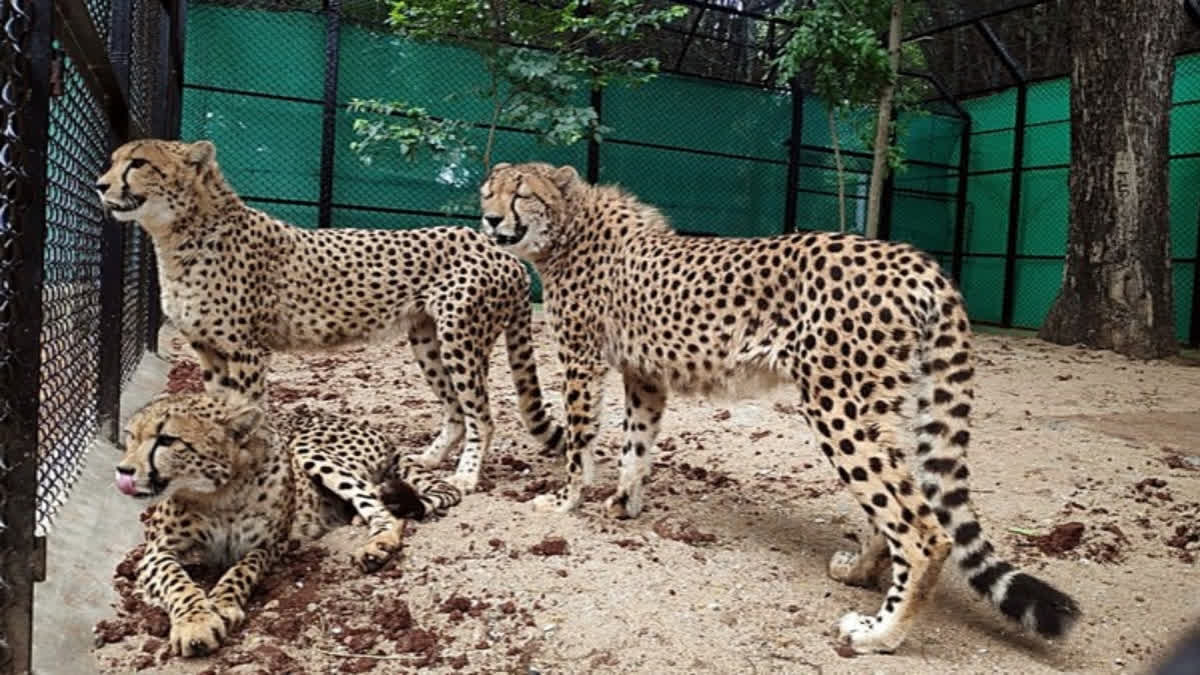New Delhi: After a series of deaths of the cheetahs at the Kuno National Park, the Ministry of Environment, Forest and Climate Change (MoEF&CC) and National Tiger Conservation Authority (NTCA), in an affidavit before the Supreme Court acknowledged the issue but asserted that the mortality rates among the introduced cheetah population are not 'unduly alarming'. In the process of reintroduction of the cheetahs in India, the felines were brought from Africa to Madhya Pradesh recently.
The affidavit submitted by the MoEF&CC and NTCA cites scientific awareness that cheetahs generally have low survival rates, with around 50 percent in adults even in non-introduced populations. In the case of introduced populations, the survival rates are even lower, approximately 10 percent for cubs, due to various variables affecting their adaptability. However, despite the troubling mortalities, the authorities argue that these figures are not unexpected given the challenges of introducing cheetahs to a new habitat.
Also read: Cheetahs dying because they develop thick coats in anticipation of African winter in India: Experts
The Supreme Court has been overseeing the reintroduction program through an application moved by an expert committee established to provide guidance and direction to the NTCA. The committee has requested the Court to keep them updated on the latest developments and to consider their advice and submissions.
During the court proceedings, the Bench raised concerns over the high mortality rate of the cheetahs within a short period. The Centre clarified that the deaths were not a result of any inherent unsuitability of the Kuno site, where the reintroduction efforts are being carried out.
Post-mortem examinations on cheetah carcasses have revealed various causes of death. Two male cheetahs that died in July likely succumbed to traumatic shock. In May, three cubs were found to be severely dehydrated and underweight, according to medical examinations. Another cheetah died due to injuries sustained during mating encounters with two adult males, including deep puncture wounds and frontal bone fractures. Additionally, one cheetah died from renal insufficiency and severe gastritis.
The Centre has emphasized that all the deaths were a result of natural causes and ruled out human-related factors like poaching, snaring, poisoning, road accidents, or electrocution.
To address the concerns surrounding the cheetah reintroduction program, the Centre has outlined several steps being taken to ensure the well-being of the remaining cheetahs in Kuno National Park. These measures include capturing all cheetahs and conducting critical medical examinations. Prophylactic treatments are being administered to the surviving cheetahs, and the project implementation is undergoing a thorough review.
International cheetah experts and veterinarians are being consulted to bring their valuable insights into cheetah management. Furthermore, efforts are being made to enhance the training and capacity building of veterinarians, frontline staff, and officials involved in cheetah management, the affidavit said.
The cheetah reintroduction program is an ambitious and prestigious initiative aimed at restoring these majestic animals to their historical range in the country. However, the recent mortalities raise concerns about the challenges and complexities involved in reintroducing a species to a new environment. As the Supreme Court continues to oversee the program, all stakeholders are determined to address the issues and take necessary steps to ensure the successful conservation and survival of these critically endangered creatures in the wild.
Also read: Jairam Ramesh blames 'vanity' for current tragedy of Cheetah deaths



